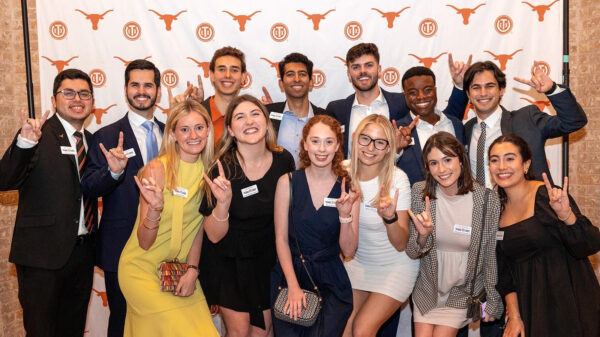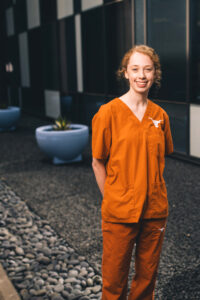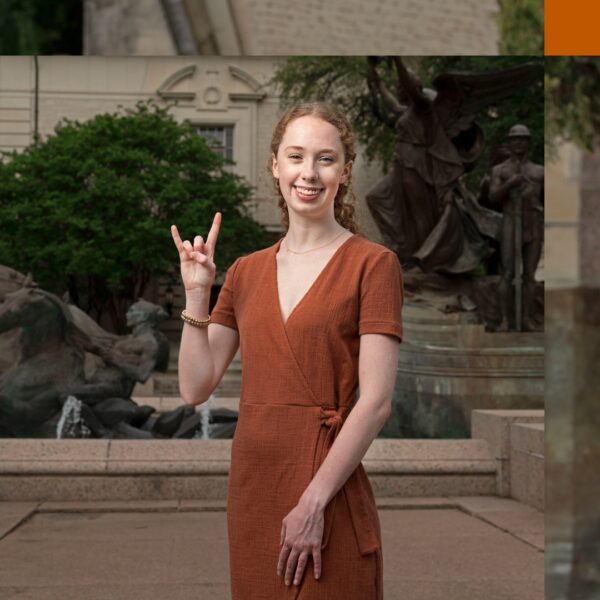When Emily Slaughter was in high school, one summer her mom said, “You shouldn’t go swimming every day. Why don’t you go get some meaningful experience?” So Emily began volunteering at a Fort Worth hospital. “I was basically a candy striper but in a really critical care unit. The nurses knew I was interested in medicine and took me under their wing and said, ‘Why don’t you come and see what we do?’”
From then on, nursing was her calling. She knew UT’s School of Nursing had a great reputation, and on a whim, applied for the full-ride Forty Acres Scholarship. Finalists for the scholarship are brought to campus for a weekend. “By the end of that weekend, I was like, ‘I don’t care if I get the scholarship; I have fallen in love with this school,’” she remembers. “This is a first-class school. This is a first-class institution. I’m coming no matter what!” But Slaughter, one of our outstanding graduates from the class of 2022, did win the scholarship, and hers was endowed by Mickey and Jeanne Klein.

Then, in the spring of her sophomore year, COVID-19 hit.
Nursing, of course, was ground zero for the pandemic. After less than one semester online, classes were back, as in person as possible, in the fall. Students still had clinical rounds, and they were heavily involved in vaccinating the public. Slaughter’s professors gave some of the first jabs in Texas.
She describes being a nursing student during COVID: “So you’re a little baby nursing student, you show up to the hospital, and you find nurses overworked and exhausted taking care of COVID patients, and you say, ‘So can you also teach me?’ We are wearing full PPE, taking care of COVID patients, and we don’t know how much exposure we’re risking. ‘Do I need to change my scrubs right now?’ It was crazy! I learned a lot of resilience. And I saw some great examples of people who really truly cared about our profession.”
Her biggest challenge was that the country was so divided in its response. “You’d hear the misinformation, and you’d just want to shake some people and say, ‘What are you talking about!’ I could see the emotional toll it was taking on the nurses I worked with day after day — educating, educating, getting screamed at, educating, ‘Please put your mask back on.’ We’ve come leaps and bounds from where we were in March 2020, but that was a challenge — just feeling a little defeated for a bit there.”
She worked at St. David’s, Baylor Scott & White and Ascension Seton medical centers. One semester she worked in Lakeway, so she and her carpool mates would leave at 5:45 a.m., take care of patients until 3:30 p.m. and make the long drive home. “Then you’d have an exam the next morning.”
She also worked at Gregory Gym during the vaccine push. “In the midst of vaccine hesitancy, the people coming to Gregory would wait in line for hours and would say, ‘I’m so excited to be here and get my vaccine.’ That was heartwarming.”

A good nurse is like a master of all trades, Slaughter says, and must juggle a lot at once. “Yes, you’re going to pass medications, you’re going to do assessments, you’re going to call the doctor and coordinate care. But you’re also calling family members and coordinating care. You’re also calling the pharmacy, and you’re working with PT and OT [physical therapy and occupational therapy], and you’re trying to get the patient into a new rehab center, but their insurance doesn’t cover it — all within a 12-hour shift, and you have three other patients. So resiliency, flexibility, critical thinking — these are all skills I’ve sharpened in nursing school.”
When she started college, she had “a very singular vision” of what nursing was. “I was going to take care of patients for 12 hours. I’d come back, and maybe they’d be there and maybe they wouldn’t be. Now, I realize that with each life you touch, you’re making a positive difference. UT expanded my mind about how many downstream changes can happen from just one person.”
Slaughter holds a special place in her heart for assistant professor Erika Tabke. “She made it such a safe space. In the midst of COVID nursing, when anxiety was really high, she said, ‘You know what? We’re going to go out on the floor. We’re going to learn. We’ll probably make mistakes, but it’s fine — we’re all together.’ She advanced my learning so much.”
Slaughter’s clinical courses were her favorites because she got to work with patients, but she also has fond memories of courses outside of nursing, such as one on 17th-century Dutch art and another on the history of American musical theater.
She already has accepted a job offer from Ascension Seton in Austin, but graduate school and certification as a nurse practitioner are likely in her future. The School of Nursing empowered her to advocate for change in the profession. In one course, each student picked a legislative bill to advocate for and testified at the Capitol. (She testified in favor of a bill that would help people with opioid use disorder get treatment in prison.)
“For a lot of students in my graduating class, getting to the finish line seems like an accomplishment that was never going to happen. With COVID changing learning from in person to online to hybrid, being here on campus and graduating is an awesome feeling.”
